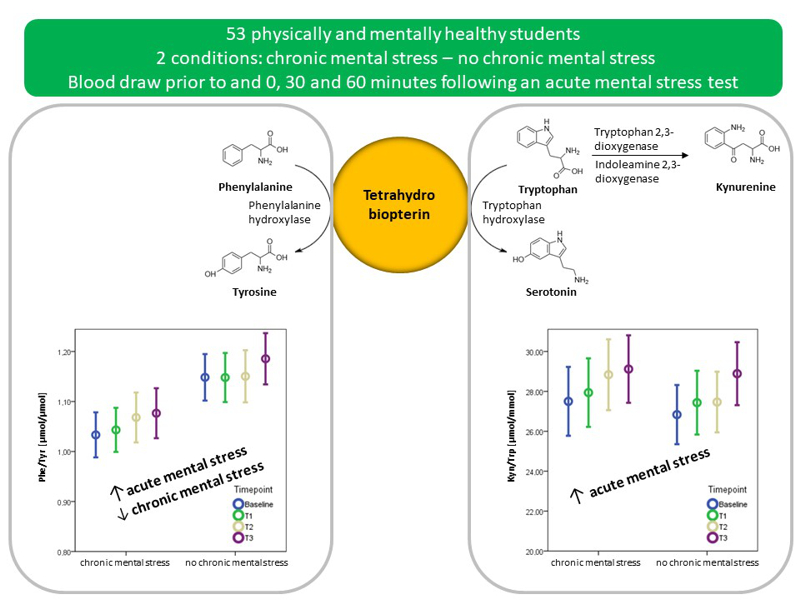Psychiatry II
Research Focus
General Facts
Research
Selected Publications
Selected Funding, Collaboration
Keywords: Mental stress, anxiety, depression, resilience, psychoneuroimmunology, eating disorders, obesity, psycho-oncology, patient-reported outcomes, high altitude and alpine psychiatry
Research (ÖSTAT Classification) : 301408, 301905, 302045, 302046, 302065, 302067
Research Focus
Psychosomatic medicine offers an opportunity for interdisciplinary research at the interface of somatic and psychiatric health and disease. We specifically address research questions in the following areas:
- The psychoneuroimmunological link between mental stress and physical and psychiatric morbidity
- Eating disorders and obesity
- Psycho-oncology and patient-reported outcome
- High-altitude and Alpine psychiatry
General Facts
The Psychiatry II division covers the field of psychosomatic medicine and serves as a supra-regional treatment facility. It provides diagnostic work-up and multimodal therapy programmes, including cognitive-behavioural and psychodynamic approaches. Evidence-based treatment guidelines and best practice experiences are incorporated into customised treatment plans for patients with anxiety and stress-related disorders, somatic symptom disorders and eating disorders. The clinical service includes in-patient and day-patient treatment programmes as well as a psychiatric-psychological consultation/liaison service.
Research in the field of psychosomatic medicine deals with the complex interactions between physical, mental and social conditions that can contribute to psychosomatic and somatopsychic comorbidities. It is characterised by interdisciplinary approaches and cooperations.
Research
Stress and Anxiety-Related Disorders
Barbara Sperner-Unterweger, Katharina Hüfner
Mental stress is linked to somatic and psychiatric morbidity but the neurobiological pathways of these associations are still not fully understood. Mental stress is known to be immunomodulatory and this is one of the basic concepts of psychoneuroimmunology. Together with our research partners at the Medical University of Innsbruck, we investigate the effects of acute and chronic mental stress on neurotransmitter precursor amino acids (kynurenine, phenylalanine, tyrosine, tryptophan) as well as on platelet aggregation and bioactivity in healthy subjects as well as individuals with depression. Our research also focuses on possible psychoimmunological mechanisms linking mental and physical disease. Patients’ perspectives are taken into account in all research activities. For example, using a mixed-method approach, we focus on assessing individual psychosomatic and somatopsychic disease concepts in patients with stress-related psychosomatic disorders. Current and ongoing research projects also include the effects of the SARS-CoV-2 pandemic on mental health as well as psychiatric sequelae of COVID-19.

Fig. 1: Graphical depiction of the amino acid neurotransmitter pathways analysed. The central role of tetrahydrobiopterin (BH4) in both pathways is emphasised. Plots of observed values of neurotransmitter precursor amino acid levels are shown as an inset. Plots represent the mean averages and 95% confidence intervals (CI) of the observed values. Baseline = T0 after 30 min of rest, T1 = immediately after acute mental stress test, T2 = 30 min after acute mental stress test, T3 = 60 min after acute mental stress test.
High-Altitude and Alpine Psychiatry
Katharina Hüfner
Somatic symptoms that can occur at high altitude, such as acute mountain sickness, have been investigated in recent years, but little is known about psychiatric and neuropsychiatric symptoms. Our research focus in this project is on investigation of the occurrence of psychiatric symptoms at high altitude as well as the effects of high altitude on individuals with pre-existing psychiatric disorders. We recently developed a questionnaire to detect psychosis at high altitude by means of simple self-evaluation questions. This questionnaire was subsequently used in a field study at Everest Base Camp to collect initial data on psychosis at high altitude. Together with research partners at Eurac Research in Bolzano, Italy, we investigate the effects of hypobaric hypoxia on neurocognitive function in a controlled, simulated environment (TerrraXcube). Projects related to the Alpine environment focus on the effects that physical activity in an Alpine environment have on resilience and quality of life in healthy individuals and in those with stress-related psychiatric disorders. The effects of Alpine environments on emotional analytics in patients and healthy controls have also been assessed.

Fig. 2: Photo of Everest Base Camp taken during the field study into high-altitude psychosis
Fig. 3: Effects of resilience on the relationship between physical activity in an Alpine environment and QOL results from mediation analysis. Numbers shown in the diagram are standardised regression coefficients. Solid lines indicate statistically significant effects; dashed lines indicate non-significant effects. MET = metabolic equivalent, Min = minutes, PA alpine = physical activity in an Alpine environment, WHOQOL-BREF = World Health Organization quality of life score – short form. a = effect of PA alpine on mediator RS-13 score, b = effect of resilience (RS-13 score) on WHOQOL-BREF total score adjusted for PA alpine, c = total effect of PA alpine on WHOQOL-BREF total score, c′ = direct effect of PA alpine on WHOQOL-BREF total score after adjusting for resilience (RS-13 score), C − c’ = indirect effect of resilience on the relationship between PA alpine and WHOQOL-BREF total score.
Eating Disorders
Barbara Mangweth-Matzek
Eating disorders have traditionally been associated with young age. However, recent data show that pathological eating can be found into old age and this is one main focus of our current research. The inclusion of various age cohorts in our scientific projects on eating disorders has resulted in identification of a link between disordered eating and menopause or andropause. Since then, various aspects of menopause and eating behaviour have been studied internationally. We are continuing our research with differentiation between menopausal stages and menopausal symptomatology aspects in relation to eating behaviour and we are planning a further study into eating behaviour, which will compare induced menopausal and pre-menopausal women.
With regard to morbid obesity, new data show a broad complexity in the aetiology of obesity. Childhood trauma is described as a highly prevalent factor in the majority of bariatric patients. Our current research is focusing on gender-specific differences. In addition, we are studying post-surgical physical and mental status.
Although anorexia and bulimia nervosa have been described disorders for a long time, many factors are still unknown. We are therefore currently conducting a long-term follow-up study into anorexic and bulimic inpatients, in order to assess outcome and try to compare recovered and chronic patients by means of a number of variables.
Patient-Reported Outcome
Bernhard Holzner
Patient-reported outcome and health technology assessment
One major research focus of our group in 2019 and 2020 was on the evaluation of medical treatments and the impact of chronic diseases from the perspective of the patient. We have conducted a number of patient-reported outcome (PRO) studies on cancer and orthopaedic patients, which have investigated clinical as well as methodological research questions with a focus on quality of life parameters. One of our most significant contributions in the field of PRO and health technology assessments has been the development of thresholds of clinical importance for EORTC QLQ-C30 and its CAT measures, for use in clinical practice and research. Additionally, we have published an example of how to implement routine electronic monitoring of patient-reported outcomes in oncology rehabilitation. Furthermore, we have extended our PRO research activities beyond oncology and orthopaedics and are conducting studies into psychosomatic medicine, which deal with in-patients and outpatients of the Psychiatry II division.
Beyond clinical studies, the research group is also involved with conducting methodological projects, i.e. the development of computerised adaptive instruments for more accurate and efficient evaluation of PRO constructs, the development of thresholds of clinical relevance for EORTC modules, and the validation of an international cancer-specific utility instrument called EORTC QLU-10D for use in cost-effectiveness trials.
Selected Publications
- Ower, Cornelia; Kemmler, Georg; Vill Theresa; Martini, Caroline; Schmitt, Andrea; Sperner-Unterweger, Barbara; Hüfner, Katharina: The effect of physical activity in an alpine environment on quality of life is mediated by resilience in patients with psychosomatic disorders and healthy controls. European Archives of Psychiatry and Clinical Neuroscience doi: 10.1007/s00406-018-0930-2. 2019; Aug;269(5); 543-553.
- Hüfner, Katharina; Fuchs, Dietmar; Blauth, Michael; Sperner-Unterweger, Barbara: How acute and chronic physical disease may influence mental health - An Analysis of neurotransmitter precursor amino acid levels. Psychoneuroendocrinology 2019; Aug;106; 95-101. doi: 10.1016/j.psyneuen.2019.03.028.
- Hüfner, Katharina; Brugger, Hermann; Caramazza, Fabio; Stawinoga, Agnieszka Elzbieta; Brodmann-Maeder, Monika; Gatterer, Hannes; Turner, Rachel; Tomazin, Iztok; Fusar-Poli, Paolo; Sperner-Unterweger, Barbara: Development of a Self-Administered Questionnaire to Detect Psychosis at High Altitude: The HAPSY Questionnaire. High Altitude Medicine & Biology 2019; Dec;20(4); 352-360. PMID: 31433210 doi: 10.1089/ham.2019.0009.
- Oberguggenberger, Anna; Meraner, Verena; Sztankay, Monika; Hilbert, Anja; Hubalek, Michael; Holzner, Bernhard; Gamper, Eva; Kemmler, Georg; Baumgartner, Teresa; Lackinger, Isabelle; Sperner-Unterweger, Barbara; Mangweth-Matzek, Barbara: Health Behavior and Quality of Life Outcome in Breast Cancer Survivors: Prevalence Rates and Predictors. Clinical Breast Cancer 2018; Feb;18(1); 38-44. PMID: 29017754 doi: 10.1016/j.clbc.2017.09.008.
- Mangweth-Matzek, Barbara; Hoek, Hans W.: Epidemiology and treatment of eating disorders in men and women of middle and older age. Current Opinion in Psychiatry 2017; Nov;30(6); 446-451. doi: 10.1097/YCO.0000000000000356.
- Kummer, Kai K; Pope, Harrison G; Hudson; James I; Kemmler, Georg; Pinggera, Germar-Michael; Mangweth-Matzek, Barbara: Aging male symptomatology and eating behavior. Aging Male 2019; Mar;22(1); 55-61. PMID: 29863438 doi: 10.1080/13685538.2018.1477931.
- Wintner, Lisa; Sztankay, Monika; Riedl, David; Rumpold, Gerhard; Nickels, Alain; Licht, Thomas; Holzner, Bernhard: How to implement routine electronic patient-reported outcome monitoring in oncology rehabilitation. International Journal of Clinical Practice 2020; Sep 3; e13694. doi: 10.1111/ijcp.13694.
- Gamper, Eva M; King, Todd M; Norman, Robert J; Efficace, Fabio; Cottone, F; Holzner, Bernhard; Kemmler, Georg; Quality of Life Group: EORTC QLU-C10D value sets for Austria, Italy and Poland. Quality of Life Research 2020; Sep;29(9); 2485-2495. doi: 10.1007/s11136-020-02536-z.
- Giesinger, Johannes M; Loth, Fanny LC; Aaronson, Neil K; Arraras, Juan I; Caocci, Giovanni; Efficace, Fabio; Groenvold, Mogens; van Leeuwen, Marieke; Petersen, Morten A; Ramage, John; Tomaszewski, Krzysztof A; Young, Teresa; Holzner, Bernhard; EORTC Quality of Life Group: Thresholds for clinical importance were defined for the European Organisation for Research and Treatment of Cancer Computer Adaptive Testing Core-an adaptive measure of core quality of life domains in oncology clinical practice and research. Journal of Clinical Epidemiology 2020; Jan; 117;117-125. doi: 10.1016/j.jclinepi.2019.09.028.
Selection of Funding
- i.d.Z.21_aCtiOn2 ? Bridging the Gap between Quality Education and Climate Action (Nr. KR19AC0K17568): Katharina Hüfner (2020-2023)
- Development of an EORTC module for renal cancer patients: Phase I-II: Bernhard Holzner, Lisa Wintner (2020-2022)
- Development of an e-learning programme on the use of EORTC quality of life Measures in clinical Practice: Monika Sztankay, Heike Schmidt (2019-2020)
- Evaluating the use of the EORTC PRO measures for improving inter-rater reliability of CTCAE ratings: Bernhard Holzner, Lisa Wintner, Johannes M. Giesinger (2019-2022)
- Comparison of the EORTC QLU-C10D with generic utility instruments and development of a comprehensive manual for its use: Eva Gamper (2017-2020)
- Comparative evaluation of the computer-adaptive EORTC quality of life measures: Johannes M. Giesinger (2017-2020)
- The EORTC QLQ-C30 Utility Project: Georg Kemmler, Eva Gamper (2016-2020)
Collaborations
- Hermann Brugger, Eurac Research, Bolzano, Italy
- Elisabeth Weiss, LFU Innsbruck, Austria
- Harrison G. Pope, MD, Biological Psychiatry Laboratory, McLean Hospital, Harvard Medical School, Belmont, Massachusetts, USA
- K. M. Giesinger, Kantonsspital St. Gallen (Dept. of Orthopedia), St. Gallen, Schweiz
- Andrew Bottomley, EORTC, Brussels, Belgium
- Josef Thaler, Department for Internal Medicine, Klinikum Wels-Grieskirchen
- August Zabernigg, Department for Internal Medicine, County Hospital Kufstein
- Fabio Efficace, GIMEMA Group, Roma, Italy
- Heike Schmidt, Department of Radiotherapy, Medical University of Halle
Univ.-Prof. in Dr. in med. univ. Barbara Sperner-Unterweger
Director
Contact:
Anichstraße 35
6020 Innsbruck
Austria
Email: barbara.sperner-unterweger@i-med.ac.at
Phone: +43 512 504 23629
Fax: +43 512 504 25267
https://psychosomatik.tirol-kliniken.at



